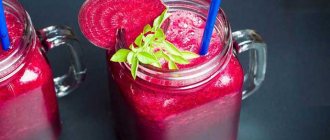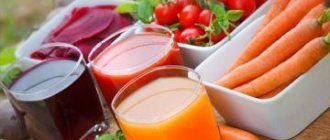Beneficial properties of beets
known to mankind since ancient times. This sweet-tasting root vegetable has an exceptional set of elements in its composition. The value of beets lies in the fact that most of the beneficial substances included in its composition are not destroyed during heat treatment.
The medicinal and nutritional value of beets has been confirmed by numerous scientific studies. It has been proven to be an excellent liver cleanser due to its betaine content. This same lipotropic substance helps lower blood pressure. The folic acid it contains makes the presence of beets necessary in the diet of pregnant women.
In our article today we will try to convince you that it is worth consuming beets every day
, and also share a variety of recipes for its preparation. Do not miss!
Beneficial properties of beets
Beetroot is a root vegetable, and it is the “roots” that are most often eaten. However, the stems and leaves of this vegetable (“tops”) are also useful and quite edible.
Beets contain a significant amount of B vitamins and plant fiber. Loads of minerals including: iodine, potassium, copper, iron, magnesium and sodium.
Thanks to its unique biochemical composition, beets are an indispensable product in a balanced diet. Here are just a few of its beneficial properties:
- Fights anemia and conditions of fatigue and exhaustion. This is an ideal product during periods of recovery and convalescence after illness.
- Naturally.
- Has anti-inflammatory properties.
- It has properties that help cleanse the blood and liver. It also helps eliminate toxins that enter our body from the outside and directly affect the liver.
- Reduces the risk of cardiovascular diseases.
- It has anti-carcinogenic properties, like most purple foods.
- Thanks to the high content of plant fibers, it improves intestinal function.
Beetroot during pregnancy and breastfeeding
Can pregnant women eat beets? Yes, but provided that the woman has normal or high blood pressure. People with hypotension should eat beets with caution.
It should be understood that beets can bring tangible benefits during breastfeeding and pregnancy. And not in the distant future, but right the next day. After all, many pregnant women experience chronic constipation (especially while taking iron supplements), and beets with their coarse fiber will be very helpful here.
If the beets also grew in fertile soil, then in addition to everything else, they will provide the woman’s body with vital, but rarely remembered micronutrients (molybdenum, boron, chromium, cobalt, vanadium, etc.). The influence of these elements on the health of pregnant and lactating women is very great, because they are involved in hundreds of processes in the body.
And, of course, all these “rare” microelements enter the body of babies who feed on the “vital juices” of future and existing mothers.
How can you cook beets?
- Stew
: If you're not a fan of the sweet taste of beets, we recommend using them as an ingredient in any vegetable or meat stews. Thus, its taste will “dissolve” among other ingredients, while the beneficial properties of beets will remain. - Boil
: Before cooking the beets, they should be washed well. It is also worth leaving a piece of the stem. If we follow these two tips, the beets will retain all their nutrients, color and flavor. To achieve a tender texture, you will likely need to cook the beets for about an hour. - Eat raw
: Fans of raw beets can eat this root vegetable in salads or as a side dish. Since raw beets are quite hard, you can grate them on a fine grater. The vegetable will add beautiful color to your favorite dishes. You can even add it to desserts, cakes or yoghurts. - Make juice or smoothie
: A delicious and original way to prepare it is to include beets in your smoothie. This way, we'll get all the nutrients found in the raw root vegetable and retain all the beneficial properties of beets, but we won't have to chew them. Beets go well with apples, bananas, wild berries, strawberries and other fruits.
Borsch
There is one traditional Russian recipe that does not lose its popularity. It's ideal for keeping you warm during the cold season. Of course, this is borscht. We offer a vegetarian version:
- Fry finely chopped onion over low heat.
- Cut the beets into small pieces, add them to the onions and simmer them together.
- When they are tender, about 7 minutes, add the vegetable broth.
- Simmer over low heat for 15 minutes.
- Add finely shredded fresh cabbage, finely chopped parsley, sherry (or other wine), salt and pepper to taste.
- According to the traditional recipe, you can also add sour cream or Greek yogurt (unsweetened).
The plant has been known to mankind for at least 4 thousand years. For a long time, only the wild variety of the plant was used. At first, only leaves were used. Root vegetables were used as medicine; they became widespread only by the 4th century BC.
The ancient Persians treated the vegetable with caution. It was believed that he brings quarrels and disagreements. If someone wanted to cause discord in the family or ruin the life of an enemy, he would quietly throw beets into the house. The ancient Romans shared a wary attitude towards the root vegetable, but despite this, they enjoyed eating it and also used it as an aphrodisiac. The Greeks were closest to the truth. Already in those days they knew about the healing properties of beets and actively used their knowledge in practice.
At the beginning of our era, root beets began to be cultivated. There was a division into fodder and table varieties, and sugar beets were distinguished separately. The vegetable acquired its usual round shape only in the 16th century; before that it was more elongated and more like a carrot. Over several centuries, the culture spread to almost all continents (with the exception of Antarctica). In Assyrian texts there is a description of its cultivation in the Hanging Gardens of Babylon.
Currently, not only annual, but also biennial and even perennial types of beets are grown. Several dozen varieties have already been bred. Every national cuisine includes favorite beetroot dishes. For example, it’s hard to imagine Russian cuisine without herring under a fur coat, Ukrainian cuisine without borscht, Belarusian cuisine without botvinya. Moreover, all parts of the plant are used: the leaves are ideal for salads; soups, main courses, even drinks and desserts are prepared from the root vegetable. Beets have become an integral part of many traditional dishes.
Nutritional value and composition of beets
A particularly valuable property of beets is its ability to retain almost all useful substances after heat treatment (except for vitamins C, B5 and B9). After all, the vegetable is rarely consumed raw, although this option is quite acceptable. The product is low-calorie - only 43 kcal per 100 g. Therefore, it can be safely included in any diet.
The vegetable consists of 14% carbohydrates - mainly due to sucrose. About 1.5% is protein, the fat content tends to zero (approximately 0.2%). The root vegetable is rich in B vitamins. It contains:
- 0.03 mg vitamin B1;
- 0.04 mg vitamin B2;
- 0.33 mg vitamin B3;
- 0.16 mg vitamin B5;
- 0.07 mg vitamin B6;
- 109 mcg vitamin B9;
In addition, 100 g of beets contain 2 mcg of vitamin A and 4.9 mg of vitamin C, as well as a significant amount of minerals:
- 325 mg potassium;
- 40 mg phosphorus;
- 23 mg magnesium;
- 16 mg calcium;
- 0.8 mg iron;
- 0.4 mg zinc.
Red beets: benefits and harm. What more?
Looking ahead a little, let's say that there are clearly more beneficial properties in red beets than harm. However, there are still some contraindications to normal consumption of beets (more on them below). Now let’s talk in more detail about the benefits and harms of beets...
The scientifically proven benefits of beets for the body are as follows:
- beets increase hemoglobin, although not with the help of iron, but with the help of substances involved in the production of hemoglobin (copper, vitamin B1)
- cleanses blood vessels from “bad” cholesterol, thereby preventing and curing atherosclerosis (with long-term regular use)
- strengthens the walls of capillaries and at the same time increases their elasticity
- dilates blood vessels, thereby lowering blood pressure (note to hypertensive patients)
- easily removes excess water from the body (relieves swelling)
- reduces the risk of prostate adenoma and rectal cancer
- has a laxative effect (increases peristalsis of the gastrointestinal tract), however, it should be borne in mind that beets help against constipation only when a person drinks a sufficient amount of liquid
- adsorbs and removes waste and toxins from the body
- regulates lipid metabolism (protects the liver from obesity)
- reduces the body’s recovery time after physical and mental stress, and also increases a person’s endurance (albeit slightly)
- stimulates brain function, thereby “pushing back” its premature aging and drying out
As you can see, the list of beneficial properties of red beets is very long. However, it should be noted that raw and boiled beets have different effects on the body.
What is the difference?
Let's figure it out. What are the benefits of raw beets?
In general, the beneficial properties of raw beets coincide with the list above. However, there is something special about it:
1) raw beets retain all vitamins
2) raw fiber has twice the “penetrating” and adsorbing power
3) low glycemic index (but we already wrote about this)
On the other hand, there is an opinion that fresh beet juice contains some harmful compounds that can harm human health. In this regard, it is even recommended to leave freshly squeezed beet juice for several hours (to give time for harmful substances to evaporate). In fact, the faster you eat raw beets (drink juice), the more vitamins will remain in them. For vitamins are destroyed not only under the influence of high temperature, but also from contact with air, light and water.
And the “harm” of freshly squeezed beet juice lies in its ability to trigger an emergency cleansing of the body (destruction of fat deposits with the inevitable release of toxins into the blood).
What are the benefits of boiled beets?
The benefits of boiled beets for the body, despite the high glycemic index, are undeniable. Moreover, in some respects, boiled beets are even healthier than raw ones. After all, during cooking, only three vitamins are mainly destroyed: C, B5 and B9 (folic acid). The remaining vitamins and minerals reach the human stomach practically intact.
On top of that, all the valuable components of beets, which are not destroyed by high temperature, become more accessible to our body (due to the partial destruction of the fiber structure).
And one more thing... boiled beets contain much less nitrates than raw ones. Because the lion's share of them is destroyed when heated or turns into a decoction.
Now you know how beets are useful and whether it is worth boiling them before eating. Let's look at the contraindications...
The benefits of beets for the human body
Many beneficial properties of beets were known in ancient times. Virgil, Plutarch, Cicero and many other outstanding personalities wrote about its valuable qualities in their works. Hippocrates often included the vegetable in his medicinal recipes. Avicenna, in one of his works, described in detail the healing qualities of beet juice. From then until today, beets have been widely used in everyday nutrition and for medicinal purposes.
Relieves constipation
Beets are the most effective and affordable laxative. Unlike medications, it acts very gently, has no side effects and is much cheaper.
The therapeutic effect is due to the presence of a large amount of fiber in the composition. It is she who makes the intestines work and naturally cleanses it, acting like a brush. In addition, the presence of fiber causes an increase in the number of beneficial bacteria in the digestive tract. Thus, adding beets to the diet normalizes the intestinal microflora and prevents the development of dysbiosis.
In principle, a vegetable in any form will have a healing effect. But to be sure, you can use existing recipes to normalize stool:
- Boiled beets are crushed and seasoned with vegetable oil. They eat this caviar for breakfast and dinner for at least a week.
- The most effective remedy, helps after 6-7 hours. 30 minutes before the first meal, take a glass of beet juice. For breakfast, choose some fermented milk product.
- 300 g of fresh beets are grated, add 10 chopped prunes, season with 2 tbsp. l. sour cream and 1 tbsp. l. honey The mixture is consumed as breakfast, washed down with water or herbal tea.
- In severe cases, beetroot decoction enemas are used.
Prevents the development of oncology
The enormous benefits of beets for the human body with cancer have already been studied and proven. During the study, it was found that the substances contained in the vegetable have a pronounced antitumor effect ( Kapadia GJ et al.
Chemoprevention of DMBA-induced UV-B promoted, NOR-1-induced TPA promoted skin carcinogenesis, and DEN-induced phenobarbital promoted liver tumors in mice by extract of beetroot (Pharmacol Res., 2003, Vol. 47, p. 141-148
). Particularly valuable for cancer patients are:
- anthocyanins
, which give the fruits a bright burgundy color, activate the process of cellular respiration; - betaine
– affects cancer cells; - lactic and ascorbic acids
– participate in oxidation; - B vitamins
– support the body.
At first, patients were prescribed 250 g of grated boiled beets per day. However, then they came to the conclusion that the optimal result can be achieved if you take beet juice obtained from 1 kg of vegetables. However, it is not recommended to drink it immediately after preparation; it is better to put it in the refrigerator for a while. The fact is that the volatile substances present in the juice can provoke drowsiness, nausea, drop in blood pressure and other unpleasant sensations, including aversion to the medicinal drink. Patients with a sensitive stomach should add oatmeal to it to soften the effect of the juice.
Cancer patients with different tumor locations took part in the medical experiment. Except for one patient, all noted a significant improvement in their condition after 2-4 weeks of treatment with beet juice. At the same time, objective results were obtained: weight gain, improvement in blood counts, etc.
Treatment with beet juice has one significant drawback - after stopping the course, the disease returns again. Therefore, doctors recommend continuing therapy for as long as possible, or better yet, for life. At the same time, we should not forget about classical medical methods. In combination they will give the most positive result.
Helps fight anemia
One of the most common blood diseases among the population of all ages is iron deficiency anemia. It can occur due to internal bleeding or large blood loss due to injury. Since ancient times, for such problems, a proven folk remedy has been used - a decoction of beets and carrots (take two root vegetables, add water, simmer for 5 hours). If the product was prepared correctly, it became viscous. It should be taken 1 tbsp. l. three times a day before meals.
The simplest method of preventing anemia in alternative medicine is to take 50 g of beet juice daily in the morning. The course lasts several months. During this time, blood counts return to normal.
Official science has not yet confirmed the effectiveness of beets in the treatment of anemia. Scientists believe that the widespread use of the root vegetable for blood diseases is explained by the association caused by the color red. In reality, color has no effect on hemoglobin levels. To increase it, iron is needed. And its content in beets is not so high - only 0.8 mg per 100 g.
Reduces blood pressure
Fans of herbal medicine claim that red beets act as a reliable antihypertensive agent. There are many recipes to relieve headaches and reduce blood pressure:
- Mix honey and beet juice in equal quantities. Leave for 2-3 hours. Drink 0.5 glasses a day.
- Raw beets are crushed and the juice is squeezed out. Mix with distilled water in a 1:1 ratio. Take 120 ml before meals.
- Beetroot salad, seasoned with butter or sour cream, is eaten for breakfast.
- Beetroot juice is mixed in equal proportions with honey. Add 100 g of marsh dried grass and 0.5 liters of vodka. Insist for 10 days. After this, filter. Take 1 tbsp. l. before eating.
- Ripe juicy root vegetables are thoroughly washed, removed from the tops, peeled, cut into thin circles or bars and filled with half a jar. Fill with cold water to the top. Place in a cool place until fermentation begins. A glass of such kvass can reduce blood pressure within 20 minutes. Therefore, the drug is used even during hypertensive crises. As you use the kvass, add water to the jar until the drink begins to lose its taste and color.
Promotes weight loss
Women especially value beets for their ability to speed up the process of weight loss. This vegetable is an ideal dietary product: it is tasty, low in calories and affordable. In addition, the fiber it contains cleanses the body, and betaine speeds up metabolism.
To maintain your figure, it is enough to regularly include beetroot dishes in your diet. However, if you need to get yourself in order very quickly, then you can use an express diet: during the day, consume only boiled beets and water.
If you want to lose more, then the diet can be extended for 2-3 days. Then you should add protein to your diet (for example, kefir or cottage cheese), you can diversify the menu with other vegetables (carrots are ideal).
To achieve the maximum effect of a strict diet, you need to adhere to 7 days. In this case, you should add porridge (buckwheat, rice), animal protein (fish, meat), dried fruits (preferably prunes) to your diet.
Note
. On the Russian-language Internet you can often find information that beets contain curcumin and thereby promote fat burning. Beetroot does not contain curcumin - this substance is found exclusively in turmeric root.
Treats runny nose
It would seem, how are beets useful for a runny nose? In fact, it can quickly eliminate congestion and relieve nasal discharge, while it is not addictive and has no side effects. Therefore, it can even be used to treat children.
To prepare the medicine, you should choose medium-sized rounded fruits with a rich red-burgundy color - they contain the maximum of useful substances. You can use both raw and cooked vegetables. However, boiled beets have a less pronounced effect.
Instilling beet juice into the nose will help not only get rid of rhinitis, but also strengthen blood vessels, prevent atherosclerosis, and also cope with infection in the nasopharynx. A good effect is observed in the treatment of adenoids, tonsillitis, as well as rhinitis and sinusitis. With allergic rhinitis, the results are less noticeable, but they are still there. The juice works as follows. When it enters the nasal cavity, it dilates blood vessels, relieves swelling and dilutes secretions, which facilitates their rapid removal out.
There is nothing complicated in preparing a remedy. However, there are some features to consider:
- The vegetable must be washed thoroughly, you can pour boiling water over it to destroy harmful microorganisms.
- It is advisable to peel the skin as carefully as possible, trying to remove the minimum layer, since it contains the largest amount of active substances.
- You can extract the juice in any available way - this does not affect its quality in any way.
- You cannot use freshly squeezed juice - it may contain harmful substances. You need to put the liquid in the refrigerator. There, within a few hours, all unwanted elements will disintegrate and will no longer pose a health hazard.
- Before use, the juice must be diluted with water. The concentration depends on the age of the patient and the complexity of the disease. The maximum permissible ratio is 1:1. For children, the amount of water needs to be increased 2-3 times to reduce the irritating effect of the medicine.
- Fermented juice has higher efficiency.
- To avoid staining the skin, you can add a little vegetable oil to the juice.
- Combination with carrot juice, garlic or honey will further improve the positive effect of the product.
By instilling the juice into the nose 3 times a day, 2-3 drops, symptom relief can be expected already on the third day after the start of treatment. In a week, complete recovery should occur.
New in blogs
A few weeks ago, the Internet literally exploded with news: red beets help maintain health. Like mushrooms after rain, reposts appeared on many sites under different names: “Beets are the healthiest vegetable for the liver”; “Nutritionists have nicknamed beets a “vacuum cleaner for the liver”... This sensation was recognized in Russia, Ukraine, Azerbaijan and other parts of the world.
“It (beets) is rich in vitamins and microelements that are necessary for the functioning of the human body. Betaine, which is abundant in it, makes beets extremely beneficial for the liver. And in terms of the content of such important elements as iron and zinc, it has no equal,” said Rosbalt, giving a link to a site about beauty and health. – As the analysis showed, beets are rich in a unique substance that is practically not found among other vegetables - betaine. This unique biologically active compound helps in the absorption of protein foods. This is why nutritionists advise serving meat with beetroot salad... Interestingly, the described properties apply not only to the root vegetable of this vegetable, which is usually eaten. Scientists have proven that beet leaves are no less useful. At the same time, young tops, compared to roots, contain 2 times more proteins and minerals, and a salad from them should not be ignored.”
The names of these doctors, nutritionists, scientists and the author of the original article have been left out in order to convey to them some clarifications.
Firstly, beets are necessary not only for the functioning of the human body, but also for our smaller brothers. Secondly, betaine (Beta) is a vitamin-like substance, a derivative of choline, also contains spinach, cereals, seafood, wine, etc. By the way, betaine in beets was discovered many years ago by Russian scientists. Praise be to them! Thirdly, beet tops, regardless of age, contain 2–3 times more protein than the root vegetable.
Of all the vegetables and fruits that normalize metabolic processes and increase the vitality of our body, the first place goes to red beets, the queen of vegetables. Wild beets (Beta) have been used since time immemorial. The Egyptian priests of Menfis used it as a means of protection from the debilitating heat and prevention of epidemics. Among the peoples of the Mediterranean, the red root vegetable of the "Egyptian" variety was the most widespread medicinal and food crop. The red beetroot diet developed by Hippocrates, as well as his advice: “If you do not want medicine to become your food, turn food into medicine,” is known from ancient medical books. The Greek physician Galen and Dioscorides Pedanius, the outstanding physician of the Middle Ages Ibn Sina (Avicenna) and other aesculapians of antiquity used beets to treat anemia, fevers, diseases of the digestive organs and lymphatic vessels, infectious diseases, putrefactive and malignant ulcers. Professor of the University of Budapest, Doctor of Medicine Sandor Ferenczi, studying the works of Pliny the Elder, revived in the 50s of the twentieth century the treatment of blood diseases and malignant tumors of the stomach, rectum, bladder, etc. with red beet juice. The treatment of radiation sickness and patients undergoing chemotherapy. The same effect is evidenced by the famous Ukrainian borscht, which became a “safeguard” from the “Chernobyl syndrome”.
All this is associated with coloring substances - flavonoids and anthocyanins, present in red beets, red and blue flowers, berries and fruits. These substances are non-toxic; their effect on the body strengthens the immune system and normalizes metabolism. And normal metabolism means good health, resistance to diseases, high performance and sexual activity. In those countries where the population consumes red beets in large quantities, there are no cancer patients.
Beetroot came to us from Ancient Byzantium. The natural and climatic conditions of our country turned out to be so favorable that Russian farmers managed to grow this crop of higher quality than in other countries.
German independent experts, having conducted scientific research on freeze-dried beet juice produced in Russia three years ago, were amazed at the richness of its chemical composition, deciding that they were improving the properties of their natural product with “sprinkles” of vitamins and microelements. By the way, one kilogram of fresh beets can easily be contained in four teaspoons of freeze-dried beet powder.
In ancient times, beets were grown as a leaf crop, used mainly for medicinal purposes. Even then they knew that beets reduce high blood pressure and help with kidney, vascular and intestinal diseases. Finely crushed tops were used to heal wounds, burns, and bites of bees, wasps and bloodsuckers. Red beets have been cultivated as a food product since 800 BC. Beet growing, which originated in the mountainous regions of Western Asia, migrated to Ancient Greece, then to Ancient Rome, where beets (both leaves and roots) were a favorite food.
As a garden crop, beets became widespread in Russia in the 13th century, and three centuries later they already enjoyed enormous popularity, were considered originally ours, taking their rightful place in herbalism. Beetroot was used to treat anemia, scurvy, tuberculosis, runny nose, and lower blood pressure. It has become a custom to serve beets cut into thin slices as an appetizer. It was believed that this salad stimulates appetite, improves digestion and the functions of the gastrointestinal tract, liver, and kidneys.
The biochemical composition of beets depends on the variety and growing conditions. Beets grown on chernozem will store more potassium and protein nitrogen and significantly less phosphorus than on other soils. Beetroot contains on average 80% water, 13–20% of dry matter consists of sugar, protein, carbohydrates, fiber, lignin, and pectin. Vitamins B, P, PP, C, Betaine... Mineral elements: sodium, potassium, calcium, magnesium, phosphorus, iron, iodine, copper, zinc, selenium, manganese, cobalt... Amino acids - lysine, histidine, arginine, aspartic, glutamic acids , threonine, serine, proline, glycine, alanine, cystine, valine, meteonine, isoleucine, leucine, tyrosine, phenylalanine. All these substances are present in beet leaves, but there are 2–3 times more proteins than in the root vegetable itself. Obviously, this is why “botvinya” - cabbage soup made from tops - was famous in Rus'. In fact, beets never get boring either raw, boiled or baked. And how can you refuse it if the combination of potassium and calcium in it is such that it ensures the normal functioning of the cardiovascular system, has an anti-sclerotic effect and normalizes the acid-base balance of the blood. And without cobalt, the main stimulator of hematopoiesis, vitamin B12, is not formed, which in turn ensures the active formation of red blood cells in the bone marrow to prevent the occurrence of anemia and help restore the level of hemoglobin in the blood. Without hundreds of grams of iodine, the hormonal process in our body is disrupted, up to 50% of people, especially women, suffer from thyroid disease, and every second of our compatriots develop fibroids. Cretinism in children is the result of iodine deficiency during the mother's pregnancy, but beets successfully eliminate iodine deficiency. It will also protect against sclerosis, improve memory, and relieve alcohol and nicotine addiction. Beetroot juice and tops have estrogenic hormonal properties. In gray times, women drank a decoction of beet tops to normalize the cycle of menstruation, get rid of infertility and make it easier to endure menopause. Beetroot decoction also served as a disinfectant.
According to doctors, not only cancer, but also cardiovascular (myocardial infarction, stroke, vascular sclerosis) diseases more often occur in people with hereditary, infectious and metabolic immunodeficiency. Strengthens the body's defenses, the acid-base balance necessary to maintain the internal environment of the body, in particular the hematopoietic system, and copper contributes to this process. Also, without 4–5 grams of iron, which is not enough for a dead nail, oxygen will not work in us. And magnesium is responsible for regulating vascular tone, preventing the formation of blood clots in blood vessels, and protecting against the development of hypertension. Therefore, a partial glass of beet juice 2-3 times a day will be enough for the metabolism to proceed as human nature intended. Cancer patients should generally drink it warm and on an empty stomach, 10–15 minutes before meals. Before use, you need to place the juice in the refrigerator for 3 hours, then it will become pleasantly healthy. Otherwise, it will cause nausea, vomiting, general weakness, a drop in pulse and blood pressure, even to a coma. You can drink beetroot with carrot, cabbage, apple, pumpkin, plum juices or with fermented milk products, according to your taste. You should introduce beet juice into your diet gradually, starting with small doses: 2-3 teaspoons, increasing the daily portion based on your well-being. If you do not follow this rule and drink the juice in large doses at once, it can cause uterine bleeding or cerebral hemorrhage. Beetroot juice is both calming and gives much more energy than any doping drug. Beets have a beneficial effect on our bones and teeth, as they contain calcium, the lack of which leads to caries, slow growth in children, bone tissue porosity and, as a result, frequent fractures. Calcium deficiency contributes to weakening and impairment of cardiac activity. Among vegetables, beets have no equal in iron and zinc content. Zinc plays an important role in the transmission of nerve impulses between brain cells. Lack of zinc in children leads to memory impairment, apathy and mental retardation. You can eat beets until March - February at most, then they (like all vegetables and fruits from winter stocks) are useless and even harmful. Since everything useful “evaporates” from it, including pectins - the “orderlies” of the intestines...
Beet pectins are capable of creating gelatinous masses in the presence of water and organic acids that stimulate intestinal movements. And moving through the intestines, they adsorb harmful products from the body: salts of heavy metals, mercury, lead, tin, toxic substances of microbial origin, rotting food debris and intestinal parasites. Beets contain saponin, which binds dietary cholesterol into insoluble complexes in the intestines. Saponin and vitamins contained in beets have an antisclerotic effect, improve cholesterol metabolism, and increase hemoblabin.
A follower of S. Ferenczi, the German doctor Sigmund Schmidt emphasizes that, among other things, red beets contain catalysts for cellular respiration - rubidium and cesium. Participating in oxidative processes in cells as hydrogen carriers, flavonoids, preventing peroxidation, protect vitamin C from destruction. It is known that in any disease, the functions of cellular respiration enzymes and protein synthesis are primarily disrupted. In the process of evolution, people, unlike animals and plants, have lost the ability to accumulate reserves of “free oxygen” in the body. Eating red-pigment-containing plant products - red beets, red cabbage, blueberries and blueberries, black currants, as well as dry red wine, saturates our body with nitrogen-containing pigments, saving us from oxygen starvation and death. But only the unique substance found in red beets - betaine - Beta - enhances respiratory processes in cells by 1000-1200%, improves the absorption of proteins, and liver function. In terms of its chemical structure, it is close to choline and lititine. Anti-ulcer vitamin U, previously identified in cabbage juice, was later discovered in red beets; with the support of its own vitamin group B1, it is not destroyed by heat treatment within an hour and, in addition to ulcers, also suppresses allergies. Beets are the only vegetable that can cleanse body cells from radiation.
From time immemorial, beet juice was very popular among the Slavs as a potent health booster. They used it to maintain good spirits, cheerfulness and a slim figure.
About a year ago, a worldwide sensation was the message of British scientists who conducted research with the participation of healthy volunteers, they were asked to drink half a liter of beet juice. An hour after taking the drink, as the scientists noted, the subjects’ blood pressure began to decrease. The maximum reduction was recorded approximately three hours after drinking the juice, and this effect lasted the whole day. British scientists explained this effect of beet juice in a very sophisticated way. The “highlight” is that 500 ml of beetroot juice per day can lower blood pressure.
Several years before this sensational discovery, more precisely, in 2000, NPO Biorhythm LLC, together with the Military Medical Academy of St. Petersburg, conducted research on dystrophy. The results were remarkable and encouraging. After all, 40% of our boys are underweight. And how can such goons be entrusted with the defense of the Motherland?
One group of underweight subjects was fed a reinforced ration - food that is customary to feed weakened children. Others “sate” on regular food plus three meals a day of cocktails made from freeze-dried beet, cranberry, and apple juices, as well as nettle and parsley. The juices were reconstituted with water and the boys were treated to it in the morning, at lunchtime and in the evening. In 20 days, the guys gained 2 kg 800 g of both fat and muscle mass, and got rid of some chronic diseases. And the boys, who were on increased rations, gained 800 g of fat during these days. Changes in body weight under the influence of the herbal cocktail and the restoration of many body functions indicate that these problems can go away if the nutrition process is radically changed. Since the ordinary food to which we are accustomed can no longer restore those disorders in the body that undermine our health. Only functionally necessary food can correct these shortcomings and prevent many, many diseases. But, unfortunately, a very narrow circle of specialists knows about these studies.
Functionally necessary food, capable of self-regulating body functions, is needed primarily by children, as intrauterine nutrition, then the children will not have mental disorders and this will protect them from suicide. Today, 60% of Russian schoolchildren enter adulthood burdened with various mental illnesses.
According to modern scientists, plant foods are the future of nutrition for a growing population. Since it cannot be satisfied only with food of animal origin. Complete plant foods with small additions of animal proteins and fats for children and sick people - this is how the nutrition of the future is seen. But even today, the daily diet of a healthy person should include at least 75-80% alkalizing foods, and if he is sick - up to 90%. And these are all the same vegetables and fruits, juices.
More than a century ago, Russian scientists thought about the high-quality preservation of the grown crops. The starting point for solving the problem was the natural fact itself: we eat fresh fruits and vegetables 4 - 5 months a year, and then we eat canned food and products imported from warm countries, which, in essence, is “food for the wrong horse” - our body is not genetically adapted perceive the exotic fruits of overseas fields. Pineapples, bananas, and kiwis, of course, will not spoil us if they do not become our main diet. And if we want to be healthy and strong, then we must eat what our own land gives us, which is traditional in Rus'.
Harm of beets to the human body
To find out why beets are harmful, you must first understand what chemical processes occur in the body after consuming it:
- When the root vegetable is ingested, an acid reaction begins in the stomach. This can provoke an exacerbation of gastritis and other gastrointestinal diseases.
- Thanks to the oxalic acid contained in the vegetable, beets are often included in folk recipes for the treatment of urolithiasis. In fact, if stones are present, eating root vegetables can only worsen the patient’s condition.
- Calcium absorption is noticeably reduced. Therefore, the risk of developing osteoporosis, fractures, destruction of tooth enamel and other pathologies caused by a lack of mineral increases. During pregnancy, difficulties may arise with the formation of the baby's bone tissue.
- Due to the high sugar content, the vegetable is undesirable for diabetic patients. In any case, you need to be careful when adding beets to your diet.
- Considering the laxative effect of the root vegetable, there is a high probability of its harmful effects on the body with a tendency to stomach upsets.
All of the possible negative effects listed apply equally to both raw and cooked beets. In any form, it affects the body almost equally. It should be understood that when consumed in moderation, the vegetable is unlikely to cause harm to health. However, if any pathologies are present, caution should be exercised.
The greatest harm beets have for the human body is its ability to absorb everything, including harmful substances. Therefore, it is best to use vegetables from your own garden. If this is not possible, the root vegetable needs to be boiled. Most of the harmful substances go into the water. When preparing first courses, the vegetable must first be blanched in boiling water for 1-2 minutes. It is not recommended to drink fresh beet juice, especially undiluted. It must be left in a cool place for at least 2-3 hours, only then consumed.
Consequences of consuming beets on a daily basis
Root vegetables contain a large number of useful substances. Consequences of daily consumption of root vegetables:
- activation of intestinal function;
- decreased blood pressure;
- decrease in cholesterol concentration;
- removal of heavy metals from the body.
It is also important to take into account that constant consumption of beets in any form helps to reduce the concentration of sugar in the blood, which is dangerous for diabetes. Raw root vegetables also have a negative effect on the functioning of the kidneys; against the background of increased inflammatory processes, gastritis and ulcers develop.
Contraindications
Due to possible deterioration of health and exacerbation of certain diseases, the use of beets should be limited in the following cases:
- Allergy
. If you are hypersensitive to the product, it should be excluded from the diet. - Osteoporosis, fractures, as well as other diseases of bones and joints
- beets reduce the absorption of calcium. - Diabetes
. The sweet root vegetable can raise your blood sugar, especially if eaten without added oil. - Diarrhea
. Due to its laxative effect, beets will only aggravate the problem. In case of chronic stool disorders, it is better to avoid eating beetroot dishes altogether. - Hypotension
. Eating beetroot dishes will further reduce blood pressure, which can lead to weakness and even fainting. - Increased stomach acidity
. The root vegetable will cause an exacerbation of the disease, as it contains a large amount of acids. - Urolithiasis disease
. Beets will not help if you have kidney or bladder stones. Not a single folk method based on the use of vegetables will get rid of stones, but it can cause a worsening of the condition.
Boiled beets overnight. Beetroot-kefir (for 3 days)
The express diet, where the consumption of beets is presented in combination with kefir, received the greatest number of positive reviews. Like the red vegetable itself, the fermented milk drink is beneficial for the whole body, especially the gastrointestinal tract. Plus, kefir can saturate well. That is, the first advantage of the beetroot-kefir three-day program is its short duration, despite which you can achieve good results (in just 3 days you can see a plumb line of 4-5 kg), the second is the absence of a strong feeling of hunger.
Kefir 1.5% fat content is suitable for the diet.
Those losing weight can use one of two diet options:
- Daily consume 1 kg of boiled or baked beets, 1.5 liters of kefir and 1.5 liters of water. You can use everything in any order.
- Use a cocktail prepared from 1 kg of boiled root vegetables and 1.5 liters of kefir. It’s easy to prepare: place the ingredients in a blender and beat until smooth. Since the drink has a somewhat specific taste, it is recommended to add herbs (parsley, dill, cilantro). Water, also in the amount of 1.5 liters, is drunk between drinks.
In addition to the specified foods, during the three days allotted for weight loss, you can eat lean cereals and soups, stews and low-fat fish. However, the portions will have to be reduced several times, otherwise a good result will not be achieved.
Despite the benefits for weight, the diet with kefir is quite strict and has a number of contraindications:
- increased stomach acidity;
- diabetes;
- tendency to diarrhea;
- renal failure;
- large stones in the biliary tract.
And one more thing: since consuming vegetables together with kefir leads to significant weakening, you need to remember to replenish the body’s vitamin and mineral reserves with special vitamin complexes.
You need to exit the light diet wisely. The main rule is a gradual return to the usual menu. For several weeks, it is advisable to limit the consumption of fatty and fried foods, alcohol, and avoid overeating so that all organs and systems return to normal.
How to eat beets
You can prepare delicious dishes from beets: soups, drinks, salads, desserts. Most often, the vegetable is used for culinary purposes in a heat-treated form: it can be boiled, stewed, blanched, or baked. Moreover, boiled root vegetables contain 2-2.5 times less nitrates than raw ones. During cooking they move into the water. In addition, when cooking, fiber is destroyed, so people with diseases of the digestive tract can add boiled vegetables to their diet.
Fresh beets are also often used for food. For example, a salad made from raw carrots, beets and cabbage plays the role of a brush - it perfectly cleanses the intestines. Beetroot juice has many uses and is widely used in folk medicine to treat a wide range of ailments. However, it should be remembered that eating raw root vegetables is unacceptable for pancreatitis, pathologies of the pancreas, ulcers and gastritis.
You should not drink freshly prepared juice. You need to let it sit for a while. For maximum positive effect, it is recommended to mix it with other natural juices: pumpkin, carrot, etc. Two glasses a day are enough.
The main thing when consuming any product is moderation. In addition, it is necessary to correctly weigh the potential benefits and harms of beets for the body. How many vegetables you need to eat per day is an equally important point. After all, Paracelsus argued that even poison can become a medicine if the dosage is correctly calculated. Therefore, properly prepared beets in acceptable quantities (for an adult - 1-2 root vegetables or a glass of juice) will bring exceptional health benefits.
Root vegetables contain a huge storehouse of nutrients
. A good feature is that they are not lost during heat treatment, so boiled beets are in no way inferior in benefits to the raw product.
Beetroot contains:
- vitamins of group B, P, PP;
- cellulose;
- folic acid;
- magnesium;
- manganese;
- potassium;
- iron;
- rubidium;
- cesium;
- sulfur.
And a huge amount of nutritional components.
The composition also contains amino acids such as arginine, histidine, betanine, etc. The amount of each substance is so significant that it allows you to replenish all the body’s reserves.
Reference
. The calorie content of beets is 40 Kcal per 100 grams of product.
We talked in detail about the chemical composition of beets, how they are useful and harmful to human health.
When can you give beets to a child?
There is constant debate about the age at which children can be given beets. Young mothers have doubts, caring grandmothers easily give advice (based on their own experience and understanding), and children... children treat red beets differently: some love them, others don’t even want to look at beets. In general, everything is as usual. Therefore, let's turn on logic, a scientific approach and knowledge about the chemical composition of beets and sort this out once and for all.
So, when to introduce beets into complementary foods? Ideally, after six months of age. Until this time, only breast milk or high-quality formulas. Can a one-year-old child eat beets? Naturally! But on one condition: the child should not be allergic to beets (start with a few grams of beets). Well, of course, you shouldn’t push beets into a child by force. No matter how useful you may find it.
Causes
The human body is so smart that it can tell itself what it is missing. If you really want a product, it is likely that it is the body that symbolizes the lack of some substances.
Diseases
If the body requires beets, this may be a sign that the liver wants to “rest.” To prevent this from happening, it is recommended to drink 100 grams of fresh beet juice in the morning for a week once a year, and another 200 grams of baked beet juice throughout the day.
What is missing in the body?
Why does the body need beets, what does it lack? This is a signal that there is a deficiency of quite rare vitamins and microelements:
- Vitamin U
is a very important vitamin, but it is worth noting that it is not produced by the cells of the body and comes only from food. The vitamin has many functions, but is mainly needed to recognize and eliminate foreign compounds. Rarely found in products. Beetroot is one of the main sources of this component. - Saponins
– fight tumors, have a beneficial effect on mental activity, and reduce the possibility of brain aging (read about the benefits of beet juice and how to take it correctly for cancer). - Chromium
is an important trace element that is necessary for proper lipid, protein and carbohydrate metabolism. Chromium deficiency affects glucose metabolism.
Other reasons
The desire to eat beets often indicates a need - beets improve metabolism and help remove toxins, waste and other unwanted compounds from the body. Many women know that beets also promote weight loss.
You may want beets not only because of a lack of something in the body. It is quite possible that the whole point is simply a matter of human taste preferences.
When can it cause harm rather than benefit?
Beets have a number of contraindications. You should know about them before including root vegetables in your diet. Contraindications are primarily due to the chemical composition of the vegetable. So it is better to avoid eating beets in the following cases:
Beets are a very popular product. This can be explained by the fact that it contains a huge amount of microelements that have a beneficial effect on the human body. The juice of this root vegetable is used in the treatment of and. Read our articles about how eating a vegetable affects, and whether this root vegetable can be eaten by people with, with,.
Benefits for weight loss
Beets are deservedly considered a dietary product - they have low calorie content and a lot of useful properties.
If desired, the fruit can be used not only as one of the ingredients of the fasting menu, but also as a complete basis of the diet.
A mono-diet can consist of beets alone with the addition of kefir, or allow a combination of root vegetables with steamed fish or lean meat.
In order for a mono-diet to have a positive effect on the body, you should adhere to the following recommendations:
- the duration of such a diet should not exceed three days;
- for the duration of the mono-diet, you need to exclude salt from your diet;
- Every day you need to drink at least two liters of clean water;
- beets can be consumed in any form, and their quantity should not exceed 1 kilogram per day.
If you combine beets with kefir, then taking kefir should precede eating the root vegetable. You should drink about 200 ml of kefir at a time and eat a medium-sized root vegetable, so that you end up with about one and a half liters of kefir per day and about 1 kilogram of beets.
Attention! Such diets are a test for the human body, so first coordinate them with your doctor or choose more gentle options - it may take longer to get results, but the body will tolerate them more comfortably.
A diet that can be classified as gentle involves the presence of not only beets, but also lean meat, as well as salads from vegetables and fruits.
To make your diet more effective, drink a glass of beetroot juice before each meal and completely eliminate flour and sweets from your diet.
By the way, you can learn how to properly drink the juice from this root vegetable from our article.
Is it possible to eat it: how often and in what dosage?
It is not at all necessary to eat a lot of vegetables, because an excess may not have a very beneficial effect on the body, despite all the usefulness of the root vegetable. In addition, before including a product in your diet, it is very important to pay attention to contraindications and possible side effects. To replenish your reserves of nutrients, it is enough to consume only 100 grams of beets per day.
Why should you eat it? Beets are a storehouse of nutrients. An important feature of the product is the resistance of its components to storage and heat treatment.
Regular consumption of this product will help solve many problems.
, in particular: anemia, vitamin deficiency, metabolic disorders, constipation. However, we should not forget that any product is useful only in moderation, otherwise, instead of replenishing the body’s reserves, there is a possibility of exacerbation of diseases such as diabetes, gastritis or calcium deficiency.
If you find an error, please select a piece of text and press Ctrl+Enter
.
Text: Irina Sergeeva
First of all, vampires should know why beets are useful. Why? Everything is very simple. They need to drink, I think, a certain amount of blood a day, and for this the victim needs to be heartily fed beets. After all, this vegetable is primarily famous for its ability to restore the quality and volume of blood...
Benefits of beets - noteworthy list
What are the benefits of beets?
, is explained by the presence in root vegetables of various vitamins (group B, PP, etc.), betaine, minerals (iodine, magnesium, potassium, calcium, iron, etc.), bioflavonoids. Beets are beneficial as a good source of vitamin C, copper and phosphorus. Beet leaves contain a lot of vitamin A, and the roots contain vitamin C. Beetroot is indispensable:
- for healthy bones, arteries and skin, as it contains quartz;
- to eliminate toxins from the body;
- to prevent the appearance or growth of malignant tumors.
- for people suffering from fluid retention in the body, and for people who suffer from obesity;
- for the production of hemoglobin, prevention of anemia, leukemia;
- for hematopoiesis - beets cope with this thanks to the high content of iron and copper in the roots;
- to cleanse the kidneys, blood, reduces the acidity of our body, and helps cleanse the liver;
- to find the right solutions, as it stimulates our brain and eliminates toxins that can accumulate in our body, maintaining good psychological health;
- for blood vessels and the heart - beets have a vasodilating, anti-sclerotic and calming effect, and are necessary for the normal functioning of the heart;
- for the prevention and treatment of hypertension, atherosclerosis and other diseases of the cardiovascular system;
- to protect against the effects of radioactive and heavy metals, since beets contain a lot of pectin substances, thanks to which the vegetable helps eliminate cholesterol and delays the development of harmful microorganisms in the intestines;
- to restore the body after exhaustion, loss of strength after illnesses, it is used as a general strengthening agent that improves digestion and metabolism;
- In addition, beets are indispensable for rejuvenating and preserving our beauty due to the presence of folic acid in beets, which promotes the creation of new cells.
However, it is worth keeping in mind one delicate property of this vegetable. Red beets are not very good for those who have a weak stomach or for those with high acidity, as they have a laxative and diuretic effect.
Preventing Breathing Problems
Beets contain silicon oxide, which helps our body effectively absorb calcium.
In turn, calcium is responsible for the condition of our musculoskeletal system and the prevention of osteoporosis and other bone diseases. And nutrients like magnesium, vitamin C and folic acid, also found in beets, are a great addition for healthy bone development. The high content of vitamin C in beets stimulates the activity of white blood cells, which protect our body from viral and bacterial diseases. Vitamin C will also help fight a runny nose and even help prevent asthma symptoms. And the natural beta-carotene contained in beets will be an excellent preventive measure against lung cancer.
Are boiled beets healthy?
While you are listing the beneficial properties of vegetables and fruits, it is worth keeping in mind that they can be useful raw, not boiled or fried. What about beets? Can you eat it raw too?
There is no need to be afraid! Boiled beets, unlike many other vegetables, are able to retain their main beneficial properties. The fact is that B vitamins and mineral salts are not very sensitive to heat. The minerals in beets are mostly alkaline in nature, which is a significant benefit given our mostly acidic diet.









